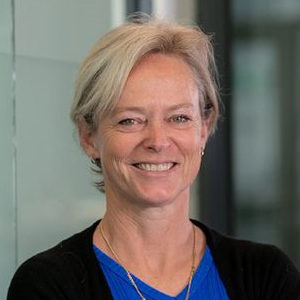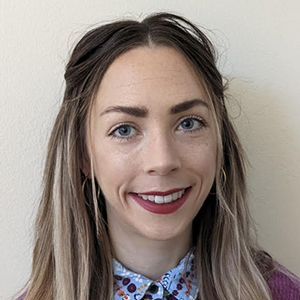Bettie J. Graham Leadership Awardees
The annual Bettie J. Graham Leadership Award for Enhancing Diversity, Equity, Inclusion, and Accessibility in the Genomics Workforce was developed by the National Human Genome Research Institute (NHGRI) to honor investigators or individuals who have had a significant influence on enhancing DEIA in the genomics workforce.
2023 Awardees

Dr. Garg's pursuit of genomics research with a global perspective is entwined with her commitment to DEIA. “As an Indian woman in science, I've faced unique challenges that have fueled my determination to create a more inclusive environment in this field,” said Dr. Garg. “My dedication to DEIA in genetics and genomics to help society is a personal mission. I believe the potential of genomics can only be realized when it is inclusive, equitable and accessible to all.”
In her doctoral and postdoctoral research, Dr. Garg focused on the development of high-quality reference genomes, emphasizing the inclusion of historically underrepresented groups, enabling a deeper understanding of genetic predispositions across diverse populations. In addition to continuing human genomics studies, some of Dr. Garg’s current research focuses on fungal genomics and sustainability, with impacts for broad international communities.
Additionally, mentorship is a cornerstone of Dr. Garg’s work. She has mentored young scientists from diverse backgrounds, creating courses, workshops, internships, and scholarships for underrepresented groups in genomics and advocating for inclusive research. She has also spoken to DEIA issues as a keynote speaker and panelist at global genomics meetings.

Prof. Mulder is passionate about making research tools and skills accessible to all African scientists and has supported DEIA through her leadership in building capacity for bioinformatics and computational genomics research in Africa. “My team and I have developed a genomics and bioinformatics training program to meet the very diverse needs and skills required to implement genomics at scale in Africa,” Prof. Mulder said. “This continent has previously been left behind in the development of genomics, and we have designed novel training approaches to enhance DEIA.”
Prof. Mulder leads the H3ABioNet, a pan-African bioinformatics network, which has trained over 4,500 individuals across Africa in genomics and bioinformatics. This training program, by design, increases diversity in the genomics workforce by targeting African scientists, clinicians and technologists and ensuring gender balance among the trainers and trainees.
Aimed at low- and middle-income countries, the training program has reached underrepresented groups in over 18 countries across Africa. In addition to making the training accessible for non-English speakers, Prof. Mulder’s team designed novel delivery methods to increase accessibility to as many participants as possible, given the enormous demand in frequently resource-limited settings.
Beyond her work with H3ABioNet, Prof. Mulder also focuses on mentoring early-career scientists, especially women in science, and she has been a mentor for two mid-career female scientists.

As an extramural program director at NHGRI, Dr. Sen works to create equitable opportunities for students and early-career researchers from all backgrounds to have access to education and training in computational genomics and data science. Having spent much of his early career in resource-limited institutions, he believes strongly that creating two-way connections between NIH and such institutions is a crucial step in broadening the future genomics workforce.
Programs in his portfolio that operationalize these objectives include the Genomic Data Science Community Network or GDSCN, a project aimed at creating a dialogue between NHGRI and faculty at small and diverse institutions, as well as the Educational Hub for Computational Genomics and Data Science and its associated Educational Partner Sites. These programs all democratize genomic data science by supporting capacity building at institutions that may not otherwise have the resources to carry out computational genomics research, thus providing new opportunities for students from diverse and historically underrepresented backgrounds.
Apart from Dr. Sen’s work within NHGRI, he also has a leadership role in the NIH Common Fund’s Bridge2AI program, where he is working with a large group of stakeholders and NIH’s AIM-AHEAD program to create training opportunities in biomedical artificial intelligence for researchers, clinicians and community healthcare workers serving disadvantaged locations throughout the US.
2022 Awardees

Dr. Sabeti, an NHGRI-funded computational geneticist and professor of evolutionary biology at Harvard University, integrates DEIA into her research and teaching.
Dr. Sabeti’s research focuses on infectious diseases, and with her collaborator Christian Happi, Ph.D., Dr. Sabeti co-founded the African Centre of Excellence for Genomics of Infectious Diseases (ACEGID). Having trained over 1,000 researchers, ACEGID has expanded the biomedical workforce and supported crucial public health endeavors.
“I view diversity, equity, inclusion and accessibility as imperative for meaningful advancement of genomics and science,” said Dr. Sabeti. “With these principles in mind, my lab and I are dedicated to empowering our collaborators and training the next generation of genomic scientists.”
In her role as an educator, Dr. Sabeti has championed mental health. “I have seen firsthand the increasing challenges to health and wellbeing that the next generation faces,” said Sabeti. In addition to leading wellness sessions in the classroom, Dr. Sabeti has served on the Harvard University Committee on Mental Health to advocate for students’ wellbeing.
Dr. Sabeti has also reached beyond her own classroom, developing interactive lesson materials about public health and infectious disease. These materials include DEIA themes and serve to engage more students with genomics topics.
By including her laboratory members in her DEIA work, Dr. Sabeti trains her colleagues to be leaders who will advocate for DEIA at their institutions and beyond.
For example, Dr. Sabeti encouraged and supported Adrianne Gladden-Young, a former senior research associate in Dr. Sabeti’s research group, in publishing an article in The Atlantic about medical racism, infectious diseases and the need for medical research fields to embrace the expertise of Black scientists.
“She listened to me, took my concerns seriously and used her platform to amplify my message as a Black scientist,” said Gladden-Young. “To me, that’s what’s most important for DEIA efforts — making networks and resources accessible so that people in underrepresented groups can thrive and move ahead in their/our environments.”
Dr. Sabeti will continue to have a lasting influence on DEIA in the genomics workforce through ACEGID, teaching and her trainees.

With over 50 years of federal service, Dr. Graham is director of NHGRI’s Division of Extramural Operations. Dr. Graham has been a leader at NHGRI since the institute’s beginning and has championed DEIA in its Extramural Research Program.
“As a member of NHGRI’s leadership team, I always make the points that (1) implementation of DEIA principles is everyone’s responsibility, regardless of one’s position in the institute, and (2) diversity is an integral part of science; these are not two separate initiatives,” said Dr. Graham.
In 2001, NHGRI convened a workshop to address the lack of scientists from underrepresented minorities (URM) in the genomics workforce. Putting these findings into action, Dr. Graham spearheaded efforts to include URM trainees in NHGRI-funded programs.
Dr. Graham continues to promote diversity in training through UNITE, an NIH-wide initiative to address structural racism in the biomedical workforce. Through UNITE, Dr. Graham has expanded and revised NIH education and training programs to create a training environment that supports equity and diversity in the scientific workforce.
Dr. Graham has recruited 17 NIH institutes and centers to participate in the Science Education Partnership Award. She is also leading the revision of the T32 training grant to include mentorship training for faculty, support for career development outside of academia and criteria for evaluating recruitment and retention.
“Leading by personal example and with her consistent and creative effort, Bettie is a powerful advocate for building the genomics workforce and increasing its diversity,” said Michael Boehnke, Ph.D., a professor of biostatistics at the University of Michigan who has worked with Dr. Graham for over 20 years in directing the university’s genomics training program. “Bettie’s kindness, generosity and absolute commitment have inspired us all, and her ability to identify key players and build connections has been central to our training success.”
Additionally, Dr. Graham succeeded in expanding eligibility of the NIH Loan Repayment Program to include genetic counselors involved in research, which removes financial barriers to careers in genomics.
Dr. Graham will retire from NHGRI at the end of 2023. Her work and outlook will leave a lasting impact on NHGRI and the genomics workforce.

Dr. Mc Cartney, Ph.D., is an assistant researcher at the University of California, Santa Cruz and a former postdoctoral research fellow at NHGRI. Through her work in biodiversity and genomics, Dr. Mc Cartney has integrated Indigenous knowledge and data sovereignty into genomics research.
Historically, genomics has harmed certain populations, including Indigenous peoples. “The notion of reconstructing and reorienting the scientific enterprise toward a more just, equitable and inclusive future can be uncomfortable and daunting, but it’s also exciting,” said Dr. Mc Cartney.
At NHGRI, Dr. Mc Cartney served on detail with the NIH Office of Science Policy, where she developed equitable data sharing policies. She also provided leadership for NHGRI’s involvement in the European Reference Genome Project and the Earth BioGenome Project. In these roles, Dr. Mc Cartney worked in collaboration with Sámi, Māori and Native American stakeholders to create genomics practices and policies.
“Ann is a highly knowledgeable scientist with added sensitivity for matters of justice,” said Marcela Uliano-Silva, Ph.D., who serves as co-chair of the Justice, Equity, Diversity and Inclusion Committee of the Earth BioGenome Project with Dr. Mc Cartney. “She teaches me so much everyday about respect for other kinds of knowledge and other ways of living. She is an inspiration to me.”
In building a more diverse and equitable future for genomics, Dr. Mc Cartney has aided in training the next generation of scientists to use genomic data ethically and with consideration for Indigenous perspectives. “I am thrilled that I have the opportunity to play a very small part of reimagining and creating this future for genomics research,” said Dr. Mc Cartney.
Dr. Mc Cartney is a co-organizer for the annual workshop IndigiData, which introduces undergraduate and graduate students to data science in a context that centers Indigenous cultures and data sovereignty. She has also led workshops with Summer internship for INdigenous peoples in Genomics (SING) in both the U.S. and New Zealand.
“Building a more diverse, equitable and just future for genomics does not happen overnight. It takes an intentional investment and a sustained commitment over time,” said Dr. Mc Cartney. “It is great to see these efforts are finally getting the acknowledgement and recognition they deserve.”
Last updated: June 6, 2024
